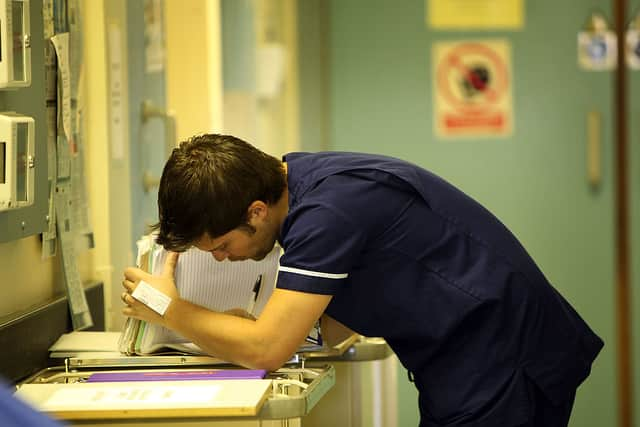Cancer patients face worsening NHS delays and more gruelling treatment due to lack of staff
and live on Freeview channel 276
Cancer patients face worsening NHS delays and the prospect of more gruelling treatment due to a lack of staff, radiology leaders have warned.
A poll of all 60 directors of the UK’s cancer centres by the Royal College of Radiologists (RCR) found 95% felt staff shortages were leading to longer waiting times for appointments and delays in cancer treatment.
Advertisement
Hide AdAdvertisement
Hide AdThe RCR has warned that every four-week delay to cancer treatment increases the risk of death by around 10%, and some 88% of cancer specialists were concerned about shortages compromising the quality of patient care.
Half of services surveyed reported “frequent delays” in patients starting radiotherapy, occurring every month or most months, while in one-in-five (22%) centres, delays occurred most weeks or every week.


The RCR warned that staff shortages mean people have been left waiting longer than necessary to start chemotherapy and radiotherapy, which in turn has forced doctors to make “difficult decisions” about who to prioritise for treatment. Some doctors were alo having to send patients to different hospitals.
The RCR also said the UK had a 15% shortfall of clinical oncologists but, by 2027, this figure would rise to 25%.Over the next five years, one-in-five clinical oncologists were expected to retire, and more than half (54%) of current clinical oncology vacancies had been open for over a year, it added.
Advertisement
Hide AdAdvertisement
Hide AdMeanwhile, the proportion of more expensive locum staff now being used had grown from 4% to 8% in the last two years.
The RCR published two reports on Thursday (8 June), one looking specifically at cancer care and the other at the clinical radiology workforce. In its second report, 80% of directors surveyed said they believed a shortage in the number of interventional radiology consultants was causing patients to receive more invasive treatment.
In 97% of centres, patient treatment had been delayed due to a lack of staff over the past year, while in about half of centres, shortages were causing delays almost every month.
Some 90% of those surveyed thought workforce shortages would impact patient safety, while only one-in-four said they had enough staff to deliver safe and effective patient care.
Advertisement
Hide AdAdvertisement
Hide AdThe RCR said the situation was a “ticking time bomb” as delays can be potentially harmful for patient care.
Dr Katharine Halliday, RCR president, said: “There are simply not enough doctors to safely treat the volume of patients needed, and this will only worsen as demand rises and more doctors leave the NHS.
“Action from the government is now critical. We must train more doctors, while doing more to retain the ones we have. There is no luxury of time: doctors are stretched, stressed, and scared for their patients.”
Minesh Patel, head of policy at Macmillan Cancer Support, said Macmillan and the Royal College of Radiologists have been “sounding the alarm” about delays to diagnosis and treatment “for years”, but the “crisis continues to be brushed aside by governments”.
Advertisement
Hide AdAdvertisement
Hide AdBaroness Delyth Morgan, chief executive of Breast Cancer Now, added: “Today’s report is the starkest warning yet that the government’s failure to tackle the crisis facing the cancer workforce, risks pushing cancer diagnosis and treatment to the brink of disaster.”
A Department of Health and Social Care spokeswoman said: “There are more doctors, nurses and staff working in the NHS than ever before, with 50% more specialist cancer doctors treating patients now compared to 2010.
“The NHS is also seeing, treating and saving record numbers of people with cancer but we know there is more to do.
“That is why we are seeking views on our Major Conditions Strategy and the NHS will soon be publishing a long-term workforce plan setting out how it will recruit and retain even more staff.”
Comment Guidelines
National World encourages reader discussion on our stories. User feedback, insights and back-and-forth exchanges add a rich layer of context to reporting. Please review our Community Guidelines before commenting.
